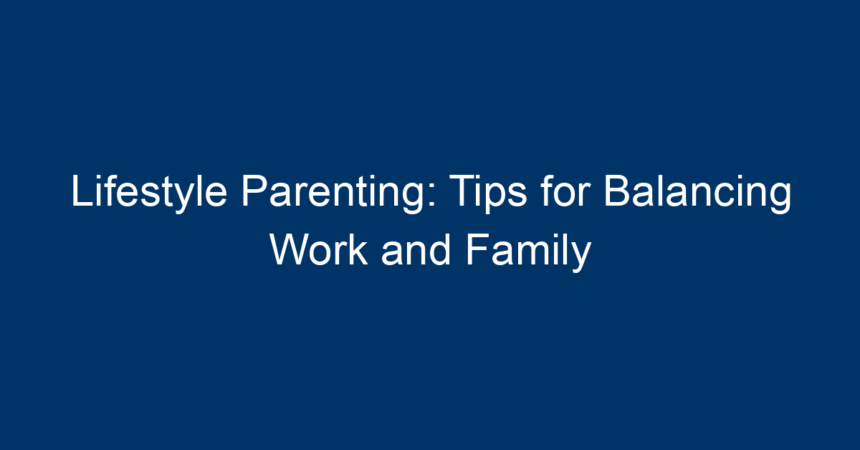In today’s fast-paced world, balancing work and family life can often feel like a juggling act. With countless demands from both your career and your loved ones, finding the right equilibrium is crucial for maintaining not only your productivity but also your mental well-being. This is where lifestyle parenting comes into play. It focuses on integrating family values into everyday life while ensuring that work commitments are met without sacrificing family time. In this comprehensive guide, we will explore effective tips to help you navigate the complexities of lifestyle parenting, paving the way for a harmonious and fulfilling family life.
Understanding Lifestyle Parenting
Lifestyle parenting is an approach that prioritizes family involvement in every aspect of life, balancing work responsibilities while creating meaningful memories. This philosophy promotes the idea that being a parent is not just a role to play, but a lifestyle to embrace. Whether you’re a full-time professional or a work-from-home parent, integrating lifestyle parenting into your daily routine can help you foster stronger relationships with your children and maintain your vitality in the workplace.
The Importance of Work-Life Balance
Achieving a work-life balance is essential for several reasons:
- Mental Health: Constantly feeling torn between work and family can lead to stress and anxiety. Creating a balance allows for mental clarity and emotional well-being.
- Quality Time: Spending time with family fosters deeper connections and creates cherished memories.
- Increased Productivity: When you’re not overwhelmed, you’re more productive at work, too.
Creating a Family-Centric Schedule
Prioritize Family Time
One of the most effective strategies in lifestyle parenting is prioritizing family time. Allocate specific times during the week dedicated solely to family activities. This could include game nights, family walks, or weekend excursions. By intentionally setting aside this time, you reinforce the significance of family and create a nurturing environment for your children.
Set Boundaries
To maintain balance, it’s crucial to establish boundaries between work and family. This means setting specific work hours and sticking to them. Inform your employer and co-workers about your boundaries; most will be supportive of your efforts to maintain a healthy work-life balance.
Involve Family in Daily Routines
Incorporating family members into daily routines can make tasks more enjoyable. For instance, involve your children in meal preparation where possible. This not only serves as quality time but also teaches them valuable life skills.
Embracing Flexibility
Adapt to Change
Adaptability is a significant aspect of lifestyle parenting. Life is unpredictable; unexpected events can disrupt even the best-laid plans. Embrace the notion of flexibility as a tool rather than a setback. If a work deadline coincides with a family event, discuss alternative arrangements with your employer.
Utilize Technology Wisely
Leverage technology to stay connected with your family, but also use it to create boundaries. Consider using family calendar apps to coordinate schedules. This keeps everyone informed and involved, reducing the chances of overlapping commitments.
Communicate Openly
Family Meetings
Regular family meetings can foster open communication and establish a safe space for everyone to voice their concerns and thoughts. Discuss each member’s schedule, upcoming events, and any adjustments needed to accommodate one another. This practice nurtures teamwork and strengthens family bonds.
Be Honest About Challenges
Don’t be afraid to share your struggles with your family. Being open about work stressors helps children understand the complexities of adult life. This, in turn, cultivates empathy and creates opportunities for family support.
Practicing Self-Care
Prioritize Your Well-Being
In the hustle and bustle of juggling work and family commitments, it’s easy to neglect your own well-being. Make self-care a priority in your lifestyle parenting approach. Regular exercise, nutritious meals, and sufficient sleep are crucial in maintaining your physical and mental health.
Engage in Hobbies
Pursuing personal interests provides a fulfilling outlet outside of work and parenting responsibilities. Whether it’s painting, hiking, or reading, dedicating time to your hobbies rejuvenates your spirit and makes you a more present and engaged parent.
Leveraging Support Systems
Build a Network
Creating a support network can alleviate stress and help manage responsibilities. This could include family members, friends, or parenting groups. Don’t hesitate to lean on your network for help with babysitting, providing meals, or even sharing parenting advice.
Professional Help
If you’re feeling overwhelmed, seeking professional help is an option you shouldn’t overlook. Therapists and counselors can provide coping strategies to manage stress or improve family dynamics.
Creating Engaging Family Activities
Explore New Interests
Make family bonding exciting by exploring new activities together. This could include gardening, crafting, or trying out new recipes. Discovering interests collectively will not only deepen your connections but also create lasting memories.
Volunteer Together
Engaging in community service is a valuable way to teach children about compassion and teamwork. Find local charities or community centers where your family can volunteer together. This fosters a sense of working towards a common goal and instills values of generosity and kindness.
The Role of Mindfulness
Develop Mindfulness Practices
Integrating mindfulness into your lifestyle parenting approach can significantly enhance emotional stability. Techniques such as meditation and deep breathing can be beneficial, not just for you but for your kids as well. Encourage family mindfulness sessions, where everyone takes a moment to reflect and reconnect.
Encourage Gratitude
Teaching children gratitude is essential in fostering a positive outlook on life. Encourage them to express what they’re grateful for regularly. This practice enhances overall family morale and shifts focus away from daily stresses.
Conclusion: Taking Action for Lifestyle Parenting
Balancing work and family responsibilities is no small feat, but with lifestyle parenting, it becomes an enriching journey rather than a challenge. By establishing priorities, embracing flexibility, practicing self-care, and nurturing open communication, you can create a fulfilling family life while meeting your work obligations.
Here are some actionable insights to help you get started:
- Prioritize family time: Block out dedicated time in your calendar for family activities.
- Set clear boundaries: Define your work hours and communicate these to your family and colleagues.
- Involve children in daily tasks: Engage them in meal prep or chores to make tasks fun and educational.
- Practice mindfulness: Create moments for mindfulness within your family routine to foster emotional well-being.
- Seek support: Build a network of friends and family who can help you navigate challenges.
Implementing these strategies will not only strengthen your family bond but also make you feel more accomplished in all areas of your life. Embrace lifestyle parenting to cultivate a brighter and more balanced future for you and your family.




